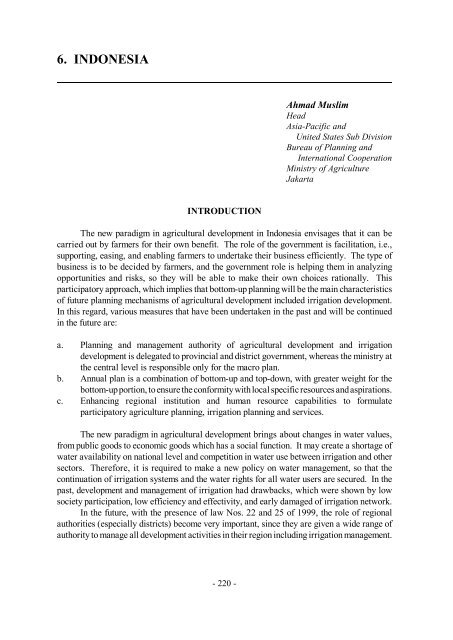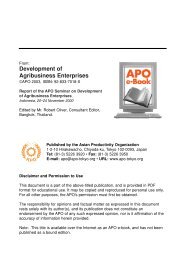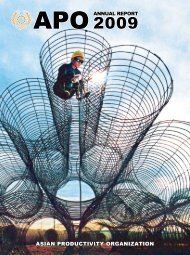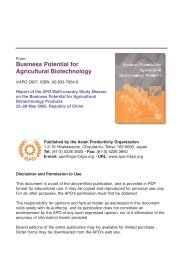Organizational Change for Participatory Irrigation Management
Organizational Change for Participatory Irrigation Management
Organizational Change for Participatory Irrigation Management
Create successful ePaper yourself
Turn your PDF publications into a flip-book with our unique Google optimized e-Paper software.
6. INDONESIA<br />
INTRODUCTION<br />
- 220 -<br />
Ahmad Muslim<br />
Head<br />
Asia-Pacific and<br />
United States Sub Division<br />
Bureau of Planning and<br />
International Cooperation<br />
Ministry of Agriculture<br />
Jakarta<br />
The new paradigm in agricultural development in Indonesia envisages that it can be<br />
carried out by farmers <strong>for</strong> their own benefit. The role of the government is facilitation, i.e.,<br />
supporting, easing, and enabling farmers to undertake their business efficiently. The type of<br />
business is to be decided by farmers, and the government role is helping them in analyzing<br />
opportunities and risks, so they will be able to make their own choices rationally. This<br />
participatory approach, which implies that bottom-up planning will be the main characteristics<br />
of future planning mechanisms of agricultural development included irrigation development.<br />
In this regard, various measures that have been undertaken in the past and will be continued<br />
in the future are:<br />
a. Planning and management authority of agricultural development and irrigation<br />
development is delegated to provincial and district government, whereas the ministry at<br />
the central level is responsible only <strong>for</strong> the macro plan.<br />
b. Annual plan is a combination of bottom-up and top-down, with greater weight <strong>for</strong> the<br />
bottom-up portion, to ensure the con<strong>for</strong>mity with local specific resources and aspirations.<br />
c. Enhancing regional institution and human resource capabilities to <strong>for</strong>mulate<br />
participatory agriculture planning, irrigation planning and services.<br />
The new paradigm in agricultural development brings about changes in water values,<br />
from public goods to economic goods which has a social function. It may create a shortage of<br />
water availability on national level and competition in water use between irrigation and other<br />
sectors. There<strong>for</strong>e, it is required to make a new policy on water management, so that the<br />
continuation of irrigation systems and the water rights <strong>for</strong> all water users are secured. In the<br />
past, development and management of irrigation had drawbacks, which were shown by low<br />
society participation, low efficiency and effectivity, and early damaged of irrigation network.<br />
In the future, with the presence of law Nos. 22 and 25 of 1999, the role of regional<br />
authorities (especially districts) become very important, since they are given a wide range of<br />
authority to manage all development activities in their region including irrigation management.
















